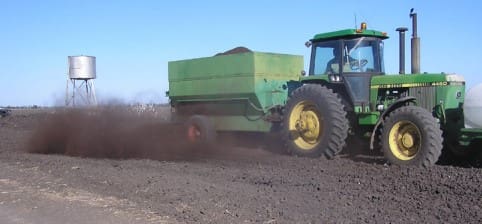 A NEW national study of the prevalence of perfluoroalkyl and polyfluoroalkyl substances (PFAS) in Australian livestock on pastures fertilised with sewage biosolids or wastewater is seeking farmer collaborators.
A NEW national study of the prevalence of perfluoroalkyl and polyfluoroalkyl substances (PFAS) in Australian livestock on pastures fertilised with sewage biosolids or wastewater is seeking farmer collaborators.
University of Adelaide researchers are seeking farmers who have previously applied biosolids as fertiliser to be collaborate in the project.
PFAS have previously been observed in Australian livestock, with higher rates found in areas where PFAS concentrations in the environment are elevated.
The research project will focus on the correlation between PFAS in livestock that grazes on land that has received sewage biosolids or wastewater in the past 10 years.
Dr Shervin Kabiri, of the University of Adelaide’s School of Agriculture, Food and Wine, said in livestock, PFAS primarily trace back to their presence in the environment, notably in drinking water, plant and feed.”
“One potential way it can accumulate in the environment is from biosolids and wastewater effluent.
“These organic waste streams are utilised as fertiliser, recycling nutrients back into agricultural land and reducing the demand for synthetic fertilisers,” she said.
“However, the potential for PFAS contamination necessitates a better understanding of the risks involved.”
Elevated concentrations of PFAS in livestock could have implications for both animal and human health, the university said. Although Dr Kabiri said she recognised that one of the major pathways for livestock exposure to PFAS is through their presence in paddocks adjacent to CFA training sites, the study will not be looking at the incidence PFAS in livestock exposed in that way.
Fellow researcher Dr Matthias Salomon said the bioaccumulative nature of these substances means they can persist and concentrate within an animal’s body, potentially entering the human food chain through consumption of animal products.
“This study aims to shed light on this critical issue,” he said.
Dr Kabiri and her research team are recruiting farmers from South Australia, New South Wales, Victoria and Queensland who have used sewage biosolids or effluent as fertiliser in the past 10 years on fields now used to raise sheep or cattle livestock.
Participating farmers will be asked to provide access to their properties so researchers can collect 30 ml blood samples from 20 sheep or cattle, as well as collect water and soil samples.
“We will make sure to keep a high level of privacy and data confidentiality.
“No individual PFAS results will be shared with anyone besides the participating farmer. However, participating farmers will receive their personal test results with a complementary consultation on what these results mean,” she said.
“The correlation of PFAS and the application of biosolids in agriculture is a complex field involving environmental samples, livestock sampling, and extensive farmer engagement, which has meant investigations into the issue have been limited.
“We hope that through this study, which is funded by the Australian Department of Agriculture, Fisheries and Forestry and includes collaborators from the University of Queensland, we can bridge this gap in our knowledge and help to improve animal and human health in Australia,” Dr Kabiri said.
Farmers interested in participating in the PFAS in livestock study can register their interest by contacting Dr Salomon via [email protected]. The expression of interest period closes at the end of May 2024.
For more information on the study, see this fact sheet here.



HAVE YOUR SAY